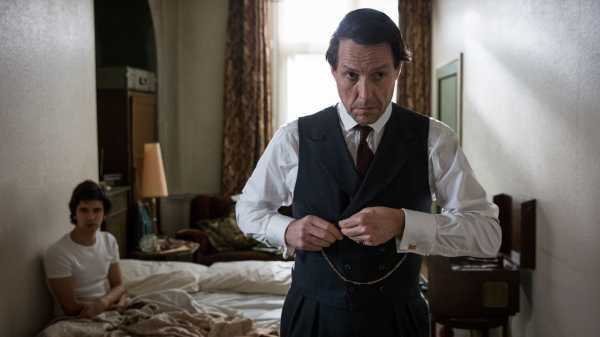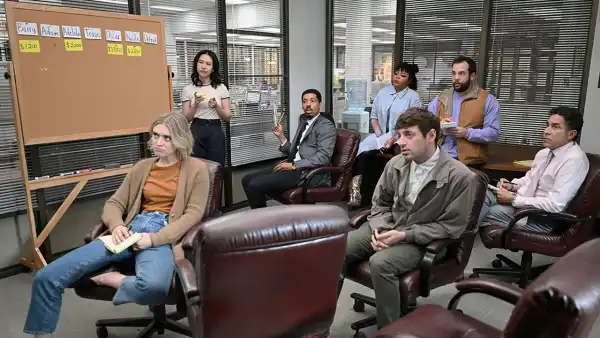
For Americans planning to watch the three-part miniseries “A Very English Scandal” when it streams later this week on Amazon, may I offer a helpful P.S.A.? John Le Mesurier was the name of a celebrated British character actor best known for playing Sergeant Wilson, a genteel, diffident officer, in “Dad’s Army,” a sitcom about the Home Guard during the Second World War, which ran on the BBC from 1968 until 1977. John Le Mesurier was also the name of a carpet salesman who was one of the inept participants in the murder plot at the center of “A Very English Scandal,” a comedic drama based on the life of Jeremy Thorpe, who was the leader of the British Liberal Party during roughly the same period that “Dad’s Army” was on TV. Thorpe’s career ended when he was charged and tried for his part in instigating the murder plot, the target of which, Norman Scott, had formerly been Thorpe’s lover, and had repeatedly attempted to go public with that damaging information.
Imagine that one of the Watergate burglars had been named Alan Alda and you will get a sense of the almost surreal confusion. Stephen Frears, the director, and Russell T. Davies, the screenwriter of “A Very English Scandal,” play with this confusion at the outset of the final episode. There’s a muttered exchange conducted, in a darkened courtyard at the Houses of Parliament, between Thorpe (played by Hugh Grant) and David Holmes, a banker friend of Thorpe’s and one of the co-conspirators of the unravelling plot. Holmes tells Thorpe that Le Mesurier can be the bagman for a necessary payoff: “Not the actor—not the one on ‘Dad’s Army,’ ” he reassures a seething Thorpe, before distractedly musing upon the actor Le Mesurier’s former marriage to Hattie Jacques, an actress equally famous in Britain in the nineteen-seventies, and best known as a star of the saucy “Carry On” films.
It’s a very English moment in a very English production, with its self-referential humor about the legacy of English television comedy, and its evocation of the state of English culture and politics in the nineteen-seventies. That was a time when everyone watched “Dad’s Army” and everyone knew about Jeremy Thorpe—both his charismatic rise to a leadership position and his career-ending fall, which resulted in his permanent exile from public life. Thorpe was forced to resign from the leadership of the Party in 1976, and faced trial for conspiracy to murder, at the Old Bailey, in 1979. He was acquitted, but his reputation was ruined, and he spent the rest of his life off the national stage.
Thorpe was also a very English-style politician, as the series revels in exploring. He apparently was effortlessly erudite, having gone to Eton, which specializes in bestowing the appearance of effortless erudition. (Boris Johnson, the current Foreign Secretary, is also an old Etonian, and shares Thorpe’s unapologetic superciliousness.) He had the kind of wit that is always called coruscating. He was dandyish: as a student at Cambridge he wore frock coats and spats, and as a Member of Parliament he always wore a waistcoat with a watch chain. He seems, in many ways, to have been insufferable, and yet he had the common touch, too, delighting his North Devon constituents by remembering names and faces, and delivering a spot-on impersonation of the local rural accent. He was also, as the series reminds viewers, a political progressive who might have had a much more successful political career had he thrown in his lot with the Conservative Party, as someone of his birth and class might have been expected to do. As a Liberal in the British electoral system, Thorpe only ever had a slim hope of Parliamentary power beyond that of being a wedge between the two dominant parties, the Conservatives and Labour.
What he also was, according to the portrayal in “A Very English Scandal,” was a closeted gay man at a time when to be openly gay was beyond the pale, at least if one aspired to a career in Westminster and public life. During the trial with which Thorpe’s career and this show culminates, Thorpe’s lawyer acknowledged that his client had had “homosexual tendencies,” but Thorpe vigorously denied an intimate relationship with Scott. The show denies Thorpe’s denial, and shows him engaging in what at best is a domineering seduction, and what at worst is a kind of violent predation. Never has a jar of Vaseline been wielded with quite such fearful authority.
“A Very English Scandal” was widely acclaimed when it was broadcast in England in May, and for good reason: it recasts a now distant-seeming epoch of British political history as a stylish comic caper. Hugh Grant gives a brilliant performance as Thorpe, whose arrogance, charm, and profoundly evasive nature he captures with subtlety. A quarter century after Grant established himself as everyone’s crush with his romantic-comedy début, in “Four Weddings and a Funeral”—all floppy hair and bumbling self-deprecation—the actor, who is now in his late fifties, has turned out to have a gift for conveying what happens to an individual when charm curdles into something considerably darker. Playing Thorpe, Grant goes from glittering smile to menacing leer in an instant. I can’t think of a performance that better captures the way in which the same characteristic that enables political figures like Thorpe to rise to power—the ability to enthrall others—is so often coupled with a tendency toward the abuse of that power. (When you’re a star, they let you do it.)
Earlier this year, Grant gave another marvellously dark comic performance as the villain of “Paddington 2,” in which he played Phoenix Buchanan, an over-the-hill actor longing for a West End comeback who talks to the collection of costumes he keeps in his attic. In that movie, Grant was cast opposite a live-action Paddington Bear, whose nature is as innocent as Buchanan’s is corrupt. Paddington is voiced by Ben Whishaw, who also appears opposite Grant in “A Very English Scandal,” as Norman Scott. Whishaw, who is twenty years Grant’s junior, is one of England’s most accomplished stage actors, and a bona-fide movie star, and he gives a performance that is the equal of Grant’s in skill and nuance. His Scott is handsome, winsome, vulnerable, and unstable. He is faintly but discernibly fey, in a manner that conveys the fraught condition of being gay in Britain at a time when homosexuality was still illegal. (Gay sex between men was not decriminalized until the Sexual Offences Act 1967; Scott and Thorpe met in 1961.) It’s a treat to watch these two great British actors encounter each other without having to do so through the medium of a C.G.I. bear.
It was bunnies, not bears, that did Thorpe in. In 1976, the Sunday Times published a letter he had written to Scott in 1962 about a proposed trip overseas, in which he had written “Bunnies can (and will) go to France,” using what Scott had said was a term of endearment that dated back to their earliest encounters. It is a mark of the wit of Davies’s screenplay that, when Thorpe’s aristocratic second wife, Marion, icily quizzes him about the use of the plural, his reply—“I was using a generic noun in an imperative clause”—is a zippy laugh line. (Marion is played with tremendous sensitivity by Monica Dolan, another excellent British actor, who is best known for her portrayal of the dour Tracey Pritchard in the BBC’s self-referential mockumentary series about the BBC, “W1A.”)
When Thorpe died, in 2014, after long suffering from Parkinson’s disease, the obituaries were generally kind, celebrating the ways in which Thorpe made good copy even before he showed up in the dock of the Old Bailey. More than one repeated Thorpe’s devastating remark about the former Prime Minister Harold Macmillan’s sacking of seven of his Cabinet members in one night: “Greater love hath no man than this, that he lay down his friends for his life.” In those obituaries, the Scott business was treated as a distasteful episode but not a damning proof of character. “A Very English Scandal” revises this conclusion, strongly suggesting that Thorpe should not have evaded conviction. In the hands of Grant and Whishaw—and in the light of #MeToo, and a rising consciousness about the ways in which disparities of power in relationships can easily tip over into exploitation of the weaker by the stronger—the portrait of Thorpe that is offered is far more darkness than light. Thorpe was acquitted but not exonerated; his career was ended not by an admission of culpability but by an acknowledgement of shame, at a time when political careers still could be.
Sourse: newyorker.com






